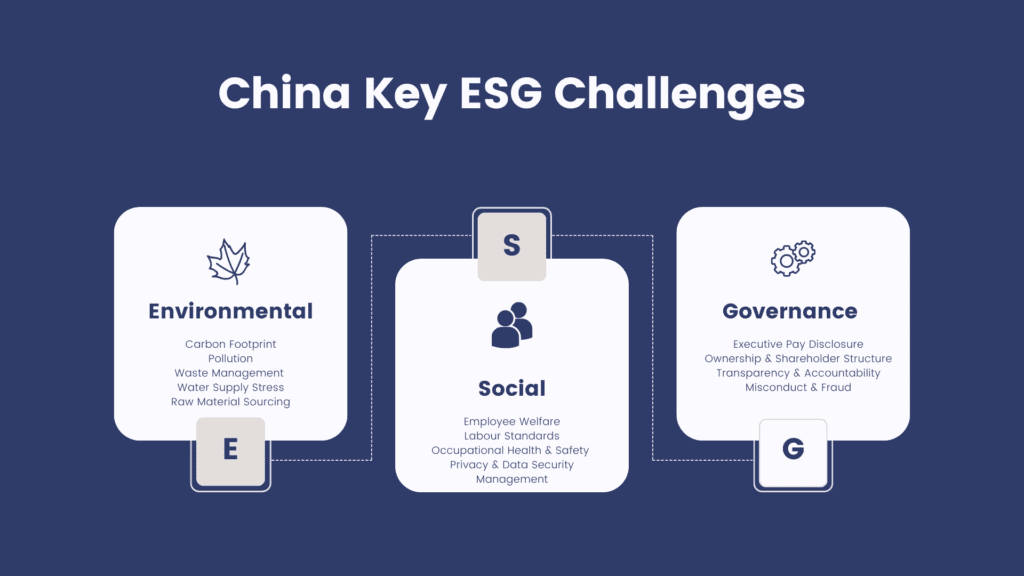Owning to China being the world’s largest consumer market, coupled with rapidly growing technology and service sectors, global investors have been willing to overlook concerns such as environmental issues, labor practices, and human rights abuses.
However, in recent years ESG ratings hold growing significance for international investors suggesting that unless China ESG standards reconcile with the Western sustainability practices, it will become less and less tangible for foreign investors to enter the Chinese market or remain in it. The emphasis on sustainability and ESG is crucial for shaping its image beyond being a manufacturing giant to also being a conscientious participant in the global community.
Below we outline some of the key ESG challenges that still prevail in China business environment.

Environmental
Environment & Climate – Carbon Footprint, Toxic Emissions (Pollution) & Waste Management
China’s status as the world’s largest carbon emitter drives a significant focus on reducing its carbon footprint (Transition to Low-Carbon Economy with 2030 carbon peak and 2060 carbon neutrality goals). Efforts to combat toxic emissions and pollution are crucial, as they impact public health and ecosystems. Furthermore, inadequate waste management and recycling practices exacerbate contribute to the environmental decay.
Natural Resources – Water Stress, Sustainable Raw Material Sourcing
Country also faces increasing water stress due to overexploitation and pollution, impacting both the environment and industry. Sourcing raw materials sustainably, especially in electronics and manufacturing, is still a great challenge.
Opportunities: Green (Clean) Tech, Renewable Energy
Green Tech: China’s commitment to green technology and innovation offers opportunities for companies involved in renewable energy, electric vehicles, and clean energy solutions.
Renewable Energy: The government’s push for renewable energy sources, such as wind, solar, and hydroelectric power, creates investment prospects in the clean energy sector.
Is ESG relevant for the SMEs in China?
Social
Human Resources – Employee Welfare, Labour Standards, Health & Safety
Ensuring fair wages, safe working conditions, and employee well-being remains a challenge, particularly in labor-intensive industries. Occupational health and safety standards, regulations and the level of implementation vary, so there are concerns about workplace safety regulations.
Privacy & Data Security Management
Data privacy and security issues pose challenges as data breaches and privacy violations often occur in various sectors.
Opportunities: Nutrition & Health
As China’s middle class expands and becomes more health-conscious (especially after the Covid-19), exciting opportunities arise for companies in the industry of health, nutrition products and services.
How to Mitigate ESG Related Risks in China?
Governance
Corporate Governance – Executive Pay Disclosure, Ownership Structure, Misconduct
Transparency regarding executive compensation is often lacking, leading to concerns about excessive pay. On top of that, ambiguities in ownership structures create challenges in assessing corporate accountability.
Internal Management – Ethics, Transparency & Accountability, Fraud
Unfortunately, Chinese companies still maintain the reputation of being inconsistent when it comes to ethical standards, transparency, and accountability within organizations. Instances of corporate misconduct and fraud are a remaining concern.
Opportunities: ESG Integration
To address governance issues companies need to integrate ESG factors into their risk management system, covering their entire business operation, and gradually make improvements in areas such as social issues, protection of minority shareholders’ rights, compliance, and accountability in the management systems.
Integrating ESG practices will help achieve sustainable growth, improve reputation, and attract investors, partners as well as the right talent.
Read our previous article to learn more about current ESG reporting requirements in China
The sustainability standards of the West are still at odds with the Chinese. Nevertheless, with the rising awareness of ESG practices, increase of ESG data disclosure and government’s focus on the subject (carbon zero transition, sustainable finance, human rights, and green supply chain management) we believe notable positive changes are coming.
We offer you 20+ years of China expertise required to help you with successful navigation through these intricate challenges. Whether your goal is to establish a presence in China or to optimize your existing business, we are well-equipped to guide you through the process.
S.J. Grand is a full-service accounting firm focused on serving foreign-invested enterprises in Greater China since 2003. We help our clients improve performance, value creation and long-term growth.
Other Articles:







